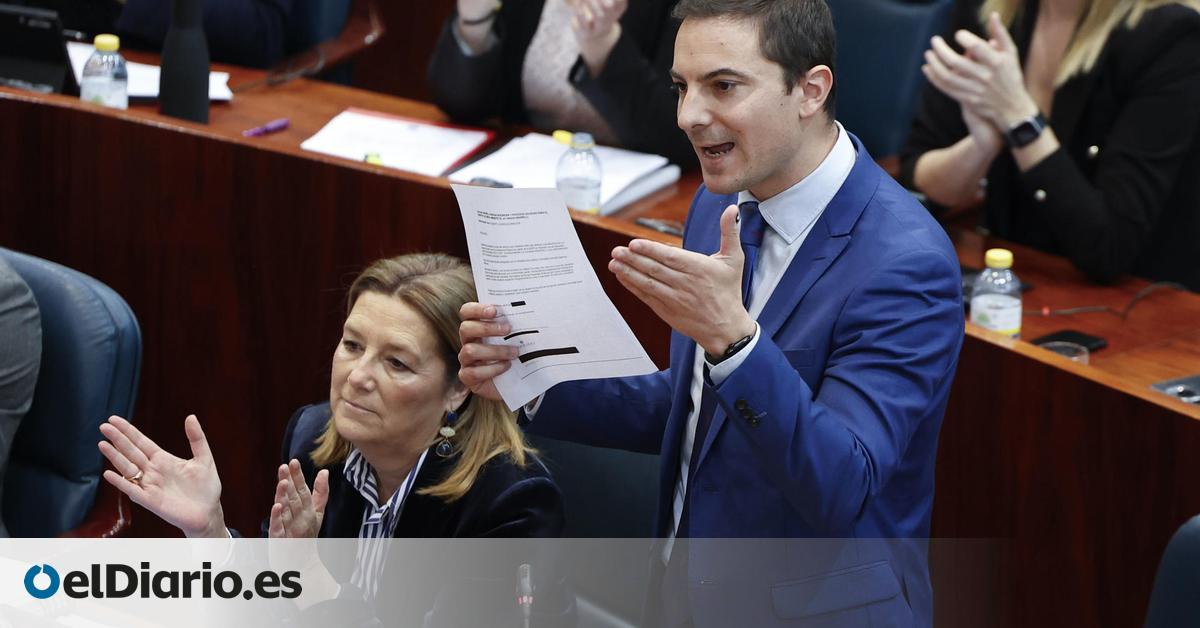
Juan Lobato, until a few hours ago leader of the Madrid socialists, declared this Friday in the Supreme Court obliged to tell the truth about how the emails from Isabel Díaz Ayuso’s partner came into his hands. The former deputy has to testify before Judge Ángel Hurtado and deliver the messages that he recorded a few weeks ago in a notary office in the capital: in which, supposedly, a Moncloa advisor offered him Alberto González Amador’s confession of tax fraud so that the used as a weapon against the Madrid president. A new derivative in the case against the attorney general for revelation of secrets that depends on the time of those messages.
The origin of Lobato’s statement dates back to March 14. When the then general secretary of the PSOE of Madrid stood up from his seat in the regional Assembly and, just after 40 minutes after ten in the morning, he brandished a document that drew loud applause from the entire opposition bench. The email that Alberto González Amador’s lawyer had sent a month earlier to the prosecutor who was investigating him to offer to acknowledge his tax fraud of 350,000 euros and accept a symbolic prison sentence in exchange for not going to prison.
The paper that Lobato waved from her seat was then a torpedo to the waterline of Isabel Díaz Ayuso’s strategy to defend her partner. Far from it being a “hunt” by the Treasury, the Prosecutor’s Office and the Government against her through her boyfriend, the businessman himself had been acknowledging his crimes for weeks and looking for a pact to avoid jail. But eight and a half months later, and with the tax fraud case practically paralyzed, that document and its dissemination those days has become an investigation that keeps the State Attorney General charged.
Juan Lobato will have to explain to Judge Hurtado how and when that email came into his hands. That morning, while he was applauded in the Madrid Assembly, he implied that he had obtained that email from “the media” who, an hour earlier, had published its contents. But the newspaper ABC has revealed that it was not their only encounter with that information. That same morning, at a time to be determined, Moncloa’s advisor and his colleague in the Madrid PSOE, Pilar Sánchez Acera, contacted him to plan the dissemination of those emails.
The former socialist leader will not only have to explain if they sent him those emails, at what time he received them and if by then any media outlet had already published them. Also if the document that he exhibited at the Madrid Assembly had been extracted, as he implied at the time, from some newspaper that he did not cite at the time, or if it is the same one that was supposedly sent to him by Sánchez Acera, then a high-ranking official in Moncloa.
Lobato’s first explanations, after learning the information, came last Monday when he was still general secretary of the Madrid PSOE. “I don’t see what the problem is with proving the lawful origin of that communication,” he said. He stated that he was convinced that his visit to the notary’s office only served to document that neither he nor the PSOE nor Moncloa had had those emails before the media. A day later, and after the internal commotion in the party, he mentioned the possibility that his interlocutor, then chief of staff of Óscar López, had lied to him.
Juan Lobato went to the Madrid notary’s office to record those messages on very important dates for the judicial case being investigated by the Supreme Court. Almost eight months after having had that conversation with Pilar Sánchez Acera but a few days after Judge Hurtado sent the Civil Guard to the attorney general’s office, precisely following the trail of those emails. Also a few days before elDiario.es revealed that the PSOE is preparing its replacement to put Óscar López in charge of the party in Madrid.
The origin of the case against the attorney general
This branch of the investigation that Lobato inaugurated this Friday runs parallel to the one that Judge Hurtado has been advancing at a good pace for weeks with two defendants: the State Attorney General and the Madrid Provincial Prosecutor. The magistrate investigates whether on the night of March 13, a few hours before Lobato – according to his version – received those emails, it was Álvaro García Ortiz who put the emails into circulation in the midst of a battle to deny a hoax from El Mundo about the action. of the Prosecutor’s Office in the case against the partner of Isabel Díaz Ayuso.
The chronology of the case begins on March 12, when elDiario.es exclusively reveals that the Public Ministry had denounced Alberto González Amador seven days earlier for defrauding more than 350,000 euros. The slogan of Ayuso and Génova was to point to an attack by the State against “an individual.” On the night of March 13, the digital edition of El Mundo published information on the case that recounted one of its most relevant episodes in the opposite direction: the Prosecutor’s Office had offered a pact to the businessman.
By then, Miguel Ángel Rodríguez himself, Isabel Díaz Ayuso’s right-hand man, and other media had falsely added that this pact had been withdrawn by orders “from above” to prolong the procedural via crucis of Ayuso’s boyfriend and, by extension, of the president of the Community of Madrid.
The reality was the other way around, as usually happens in these cases, although much earlier than usual: it had been Alberto González Amador’s lawyer who, a month before, had written to the Prosecutor’s Office to acknowledge his crimes and agree on a sentence that would allow him avoid jail. The Public Ministry, by order of the attorney general, requested these emails from the prosecutor in the case and the next day, at 10:20 in the morning of March 14, issued a statement without revealing its content but explaining that the events had not happened. So.
At first, the case, when it was processed before the Superior Court of Madrid, was directed against that statement from the Prosecutor’s Office. But it was the Supreme Court that gave a twist to the case and, after rejecting that the statement revealed confidential information, launched itself to investigate whether the attorney general had disseminated those emails literally. Because by the time the Prosecutor’s Office published its statement, several media outlets had already reported on the emails, either citing their content or showing the entire document.
Various media outlets reflected its content without disseminating the document on the night of March 13, and the first publications with the document arrived at nine in the morning the following day. An hour and a half before Lobato triumphantly brandished the email before the Madrid Assembly. The minutes of the notary that he secretly went to at the beginning of November will reveal whether those emails exchanged between Alberto González’s lawyer and the prosecutor Julián Salto were also in the hands of Moncloa or if, in reality, they were limited to giving political use to information. already published.
Source: www.eldiario.es
